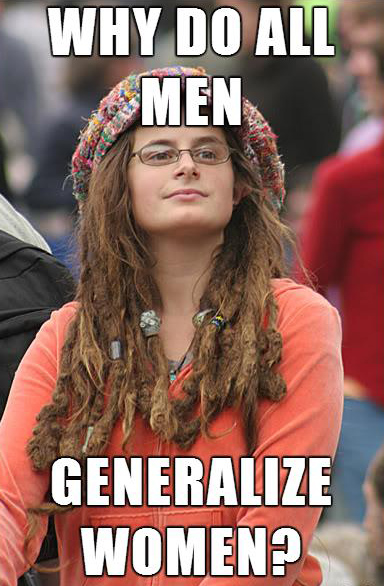Absolutes have absolutely no place in feminism
By Natalie Serafini, Assistant Editor
In all my years of exposure to feminism, and with the fractured nature of the movement as a whole, I’ve encountered a lot of different views. While I hate to generalize, I have to say, the feminism I absolutely hate is a feminism of absolutes.
What does this mean? It means that in a movement as broad and far-reaching as feminism, there’s a temptation to boil it down to something that’s easily digestible, or that can be spread real thin and applied to all people. While this propensity for generalization is understandable, it isn’t acceptable; when you deal in absolutes, you set yourself up to be incorrect and unfair.
There are myriad manners in which absolutes can sneak their way into feminism, and you could write a series of essays on any of these topics—and many have. I’ll limit myself to a condensed op-ed on the reprehensible belief that all men are reprehensible.
The short version is: it’s bullshit.
The long version is: it’s bullshit because it’s predicated on anecdotal evidence—which shouldn’t be given more weight than a case study would. I’m aware that some men have archaic views about a woman’s place in society. I’m equally aware that some women have archaic views about a woman’s place in society. Generalizing from individual instances is a recipe for wrongness.
Sex does not determine opinion or character. Stating that men are naturally sexist is an argument based in biological determinism—the same brand of argument that states women are limited by their sex. Even the vague “most men are sexist pigs” is a broad statement that begs for actual evidence—which likely doesn’t exist.
What concerns me is that these generalizations about men have been making their way into the mainstream mentality, and this propensity for belittling and stereotyping men, ever-growing in popularity, is sexism. So many people decry that label when the object of subordination isn’t a woman, but sexism isn’t discrimination against women: sexism is discrimination and prejudice based on sex. It’s evident in the advertisements that paint men as bumbling buffoons; it’s in the undeveloped, impulsive statements that demonize all men because of a few bad ones.
I’m in no way implying that feminists—even those with whom I disagree—are squarely behind it. To be perfectly honest, I don’t consider anyone who makes generalizations about any sex to be a feminist. It may begin as feminist rage, but it’s corrupted to the point of treating men with the same heavy hand that’s been applied to women.
Unfortunately, everyone is capable of sexism—I myself still have to be conscious about not using gendered insults. It’s despicable that someone might advocate for equality, direct hate at and belittle men, and then masquerade that sexism as feminism.
Some people distance themselves from the feminist movement under the simplifying statement that “I don’t look at things as being men against women.” While, again, I don’t see someone who vilifies men as being at all representative of feminism, I can understand why someone might be off-put by the feminist movement. The people who turn their activist rage into accusatory rage tend to be the loudest, and to assert themselves with provocative statements that are constructed to provoke.
That’s a further danger: in addition to speaking in unfair absolutes about a sex, and shifting the sexist lens to include another group, these gross generalizations inevitably alienate people who might otherwise agree with and support the feminist movement; as our Editor-in-chief so eloquently articulated in a recent Lettitor, feminism ain’t done yet.


